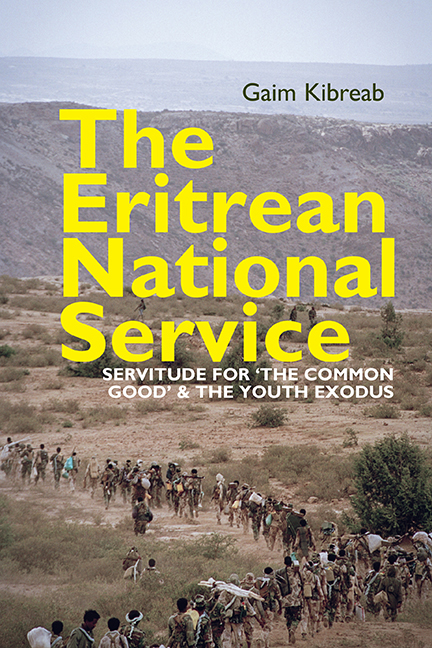Book contents
- Frontmatter
- Dedication
- Contents
- List of Figures and Tables
- Foreword
- Acknowledgements
- List of Acronyms & Abbreviations
- 1 Introduction
- 2 National/Military Service in Africa: Theories and Concepts
- 3 The Government and the Structure of the Eritrean Defence Force
- 4 The Nature of the Eritrean National Service and its Effectiveness as a Fighting Force
- 5 The Eritrean National Service as a Mechanism of Preserving and Transmitting the Core Values of the Liberation Struggle
- 6 The Eritrean National Service: A Vehicle for National Unity and Cohesion
- 7 The Eritrean National Service and Forced Equality
- 8 The Overarching Impact of the Eritrean National Service on the Social Fabric of Eritrean Society
- 9 Impact of the Open-Ended Eritrean National Service on Families and Conscripts
- 10 Conclusion
- Postscript: The UK Upper Tribunal (Immigration and Asylum Chamber) Country Guidance on Eritrea
- References
- Index
- Miscellaneous Endmatter
5 - The Eritrean National Service as a Mechanism of Preserving and Transmitting the Core Values of the Liberation Struggle
Published online by Cambridge University Press: 11 August 2017
- Frontmatter
- Dedication
- Contents
- List of Figures and Tables
- Foreword
- Acknowledgements
- List of Acronyms & Abbreviations
- 1 Introduction
- 2 National/Military Service in Africa: Theories and Concepts
- 3 The Government and the Structure of the Eritrean Defence Force
- 4 The Nature of the Eritrean National Service and its Effectiveness as a Fighting Force
- 5 The Eritrean National Service as a Mechanism of Preserving and Transmitting the Core Values of the Liberation Struggle
- 6 The Eritrean National Service: A Vehicle for National Unity and Cohesion
- 7 The Eritrean National Service and Forced Equality
- 8 The Overarching Impact of the Eritrean National Service on the Social Fabric of Eritrean Society
- 9 Impact of the Open-Ended Eritrean National Service on Families and Conscripts
- 10 Conclusion
- Postscript: The UK Upper Tribunal (Immigration and Asylum Chamber) Country Guidance on Eritrea
- References
- Index
- Miscellaneous Endmatter
Summary
One of the aims of the Eritrean National Service (ENS) is to preserve and transmit the core values engendered during the liberation struggle to the present generation. This chapter examines the extent to which the ENS is an effective mechanism of preserving and transmitting these values to the present generation. It also discusses the impact of a war fought against an external enemy on internal solidarity and on citizens’ willingness to serve and sacrifice their lives in defence of these values, as well as in the service of the nation. As discussed in Chapter 4, the relationship between the warsai and the yikealo is hostile, and understandably these inauspicious relationships between those who are supposed to transmit the values of the liberation struggle and the recipients is likely to impact upon the effectiveness of the ENS as a mechanism of transmission. This chapter also identifies the virtues and vices the conscripts developed and internalised in the process of participating in the national service. Some abuses unrelated to the aims and objectives of the ENS, such as exploitation of conscripts’ labour power for commanders’ personal gain and how these corrupt activities and practices reduce the effectiveness of the ENS to function as a mechanism of preservation and transmission of the values and culture of the liberation struggle are also discussed.
As evidenced in Chapter 2, national/military service is perceived as a civic duty and as an expression of political and civic rights; this is said to create and reproduce core values that are amenable to greater crosscultural understanding, mutual respect, national unity and greater commitment to the common good. More often than not, these values are developed and reproduced in conditions of war fought against a common enemy. As set out in Chapter 2, war fought against a common enemy produces social capital, which is the glue that holds a society together, including those marked by ‘super diversity’ (on the latter concept see Vertovek 2007). The gluing effect of war on solidarity and social cohesion is well documented (see Chapter 2). This is due to war's ability to engender a set of values and a sense of common purpose among citizens that are necessary conditions for solidarity and unity. Edward E. Carr (1942: 115) observed that war engenders meaning and purpose otherwise absent in modern societies.
- Type
- Chapter
- Information
- The Eritrean National ServiceServitude for 'the common good' and the Youth Exodus, pp. 75 - 93Publisher: Boydell & BrewerPrint publication year: 2017



